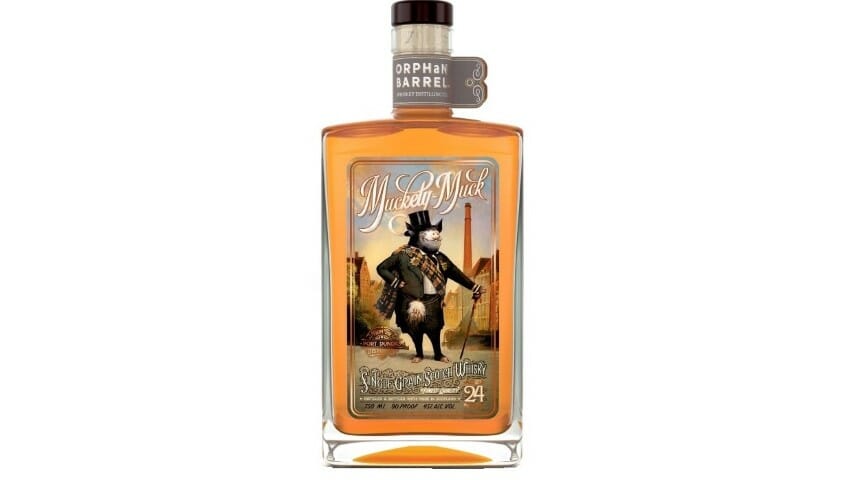Orphan Barrel Muckety-Muck Single Grain Scotch Whisky
Photos via Diageo, Orphan Barrel Drink Reviews whiskey
I never know quite what to make of the idea of ultra-premium “single grain” scotch whisky. Whereas well-aged malts are an easily understood commodity for whiskey/whisky geeks, expensive single grain whiskies, though increasingly frequent, are harder to wrap one’s head around because of the sheer lack of information you truly possess about their make and manufacture. And it’s always harder to judge something you’re drinking if you don’t fully understand the makeup of what it is you’re drinking.
“Single grain” whiskies are like the long-lost brother of single malt whiskies. As in the more familiar term, the word “single” in this label simply means they’re the product of a single distillery, rather than a blend of distillates from multiple distilleries. The “grain” part, on the other hand, is more complex—whereas a “malt” whisky will be made exclusively with malted barley, “grain” whisky can be made with pretty much anything else—corn, wheat, rye and more. Like single malt scotches, they tend to be aged in reused barrels, meaning that a Scottish “single grain” whisky could actually have a mash bill that is more or less similar to American bourbon if corn makes up the majority of that mashbill—but it won’t really taste like bourbon, due to being aged in used rather than newly charred oak. Like single malt whiskies, single grain whiskies must also be aged a minimum of three years in some form of oak to qualify as scotch.
For decades, grain whiskies were rarely bottled on their own—they were produced in vast quantities, but the purpose for their existence was to form the lighter backbone of major blended scotches such as Johnnie Walker, Dewar’s or Famous Grouse, which would then be mixed with relatively smaller amounts of malt whisky for flavor. In recent years, however, “single grain whisky” has begun to emerge as a more viable style, with older releases of single grain stock from well-regarded distilleries. Rarely, though, does one possess a ton of information about, say, what kind of mashbill makes up a single grain whisky.
Such is the case with the newest Orphan Barrel release from Diageo, a 24-year-old single grain whisky called Muckety-Muck—the second scotch release in the Orphan Barrel series in a row, after 2019’s Forager’s Keep from Pittyvaich, which I really enjoyed despite the sky-high price tag. Muckety-Muck hails from the defunct, “ghost distillery” Port Dundas outside of Glasgow, Scotland—established in 1810, it closed its doors for good in 2010. The label sports a proud pig, a reference to the whisky’s namesake, a pig named Muckety-Muck who lived at the distillery and reportedly won countless medals in livestock judging competitions. It was bottled at 45% ABV (90 proof), and carries an MSRP of $225—almost half of what Forager’s Keep cost, but still a very high price tag for single grain whisky in particular.
Which is all to say, it’s hard to know what’s a reasonable MSRP, when it comes to a very well-aged single grain whisky from a distillery that few know very well at this point. We can only go off the liquid in the bottle, so let’s get to tasting our sample.
On the nose, initial impressions are of oak, fruit and a surprising amount of ethanol—it feels boozier than expected for the relatively low proof. Apple and stone fruit provide some nice top notes, with plenty of vanilla and hints of seasoned oak. It smells lightly sweet and predominantly fruit-forward, but not particularly distinctive.
On the palate, Muckety-Muck is fairly light in texture, but isn’t lacking in sweetness and spice in particular. The fruit notes of apple and pear are still there, but they give way to lots and lots of spice—hot ginger and allspice, which heat up in the chest, along with notes of butterscotch and slight cocoa. It’s not overcome by oak by any means, although it does finish with an oaky note that turns slightly bitter over time. In general, it’s slightly watery in texture but still feels slightly hotter than the 90 proof would suggest, especially in the chest.
All in all, Muckety-Muck is perfectly pleasant for neat drinking, but it lacks the depth and assertiveness you’d likely be wanting from any bottle where you were plunking down more than $200. It just seems like a given that at this price range, you’d demand to be blown away, and Muckety-Muck, though pleasant, doesn’t wow one in the fashion of Forager’s Keep. Tasted blind, there are plenty of whisky fans who would likely enjoy this, but I don’t think they’d want to pay $225 for it.
As for the Orphan Barrel series itself, one has to wonder if perhaps Diageo has been slowing it down a bit. It was originally a series built on highly aged American whiskey releases, typically with multiple releases per year, but the last two years have seen only one release each, and it’s been the first two scotch whiskies in the series. Perhaps Orphan Barrel will continue with scotch releases and redefine itself that way? Or perhaps well-aged reserves of American whiskey have been harder to come by? We’ll have to wait and see.
Distillery: Port Dundas Distillery (via Diageo, Orphan Barrel)
City: Glasgow, Scotland
Style: Single grain scotch whisky
ABV: 45% (90 proof)
Availability: Limited, 750 ml bottles, $225 MSRP
Jim Vorel is a Paste staff writer and resident brown liquor geek. You can follow him on Twitter for more drink writing.